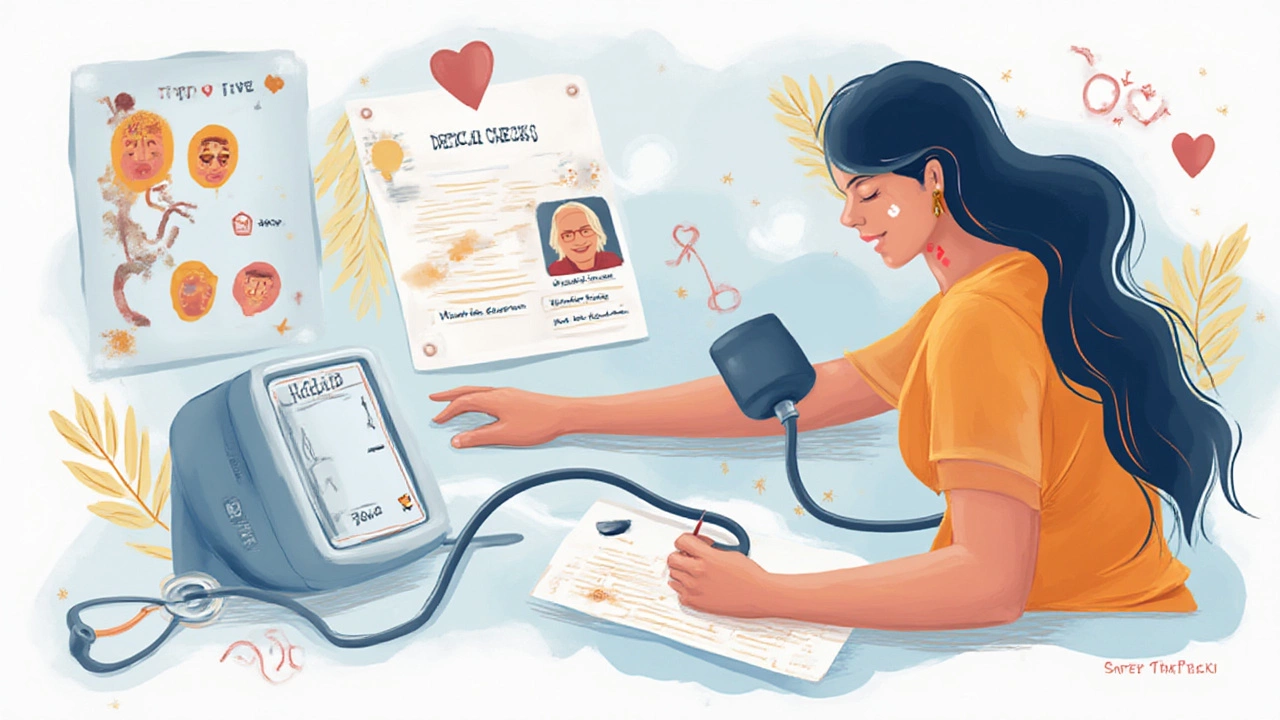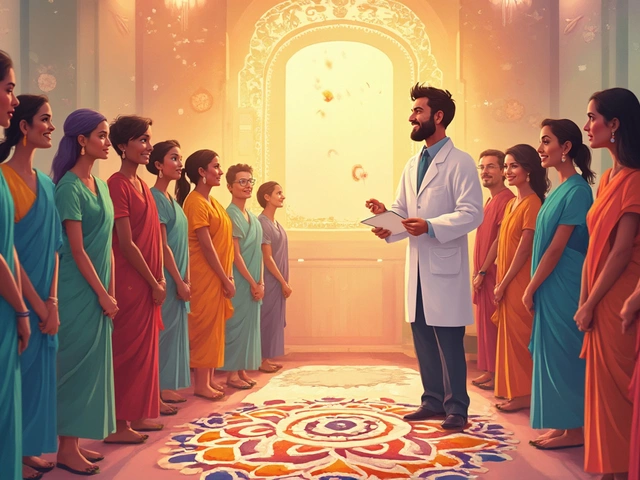Imagine waking up with a slight fever, thinking, 'Is this just Bangalore humidity or something serious?' Most of us brush it off until a bigger health scare makes us google 'full body checkup near me'. But do you even know what's really covered when you go for a health check?
Sure, a health check sounds like a big, complicated thing. But it's really just your body’s annual review—sort of like an MOT for your car, except way more useful. Even young, healthy people are facing rising cases of lifestyle diseases these days. Diabetes, high blood pressure, vitamin deficiencies, even some cancers—most start quietly, without making a fuss. Regular health checks can catch these early, sometimes even before you notice a single symptom.
What Actually Happens During a Health Check?
Let’s break down what to expect—because the truth is, a proper health checkup is more than just taking a few vials of blood or stepping on a scale. You’ll start with a long chat with the doctor (a.k.a. ‘history and consultation’). This isn’t small talk. The doctor will ask about your current health complaints, family medical history (think diabetes, heart issues, thyroid problems), your daily habits (like smoking, drinking, sleep schedule, and what your plate looks like). It feels a bit like detective work—but every piece of this background gives context to your results. In India, genetics play a giant role in diseases, so don’t skip details even if they seem unrelated.
Next up, the physical examination. The doc listens to your heart with a stethoscope, checks your pulse, measures blood pressure, looks at your skin and eyes, and sometimes even peeks in your ears. You might feel a little like a machine being serviced, but trust me, these simple checks can reveal a lot. A quick heart rate or abnormal sound can be an early warning for serious conditions.
The real meat of the health check—the tests. Most standard packages include:
- Blood investigations: CBP (Complete Blood Picture) and ESR (Erythrocyte Sedimentation Rate) give a quick peek into potential infections, anemia, or even certain cancers.
- Blood sugar (fasting and postprandial): Crucial for diagnosing diabetes or prediabetes, which is rampant in Indian metros—30% of adults, according to the Indian Council of Medical Research, have abnormal blood sugar and don't know it.
- Lipid profile: This tests different cholesterol types. High ‘bad cholesterol’ (LDL) is a silent, leading cause of heart attacks in people as young as 30.
- Liver and kidney function tests: Just because you feel okay, doesn't mean your organs are happy. Fatty liver is found in about 35% of healthy Indian adults—often picked up incidentally.
- Thyroid tests (TSH, T3, T4): India has around 42 million people with thyroid disorders—most go undiagnosed for years.
- Urine analysis: Ketones, glucose, proteins, blood—if any of these show up, something deeper might be brewing.
Add-on tests depend on age, gender, and family history. Ladies over 35 might get mammograms and pap smears. Guys over 40 might get a PSA test for prostate health. ECGs, chest X-rays, and even basic eye or hearing tests could be included. Some Bengaluru hospitals now even throw in vitamin D and B12 tests, because so many of us are low from sitting indoors. Didn’t think a white-collar desk job could hurt you like that? Think again.
| Test Name | Why It's Done | How Common is the Issue? |
|---|---|---|
| Blood Sugar | Check for diabetes and prediabetes | 1 in 3 adults in Indian metros has high blood sugar |
| Lipid Profile | Assesses cholesterol, heart risk | 41% of urban adults in India have abnormal lipids |
| Thyroid Panel | Detects thyroid imbalances | 42 million Indians with thyroid issues, mostly undiagnosed |
| Liver/Kidney Tests | Spot silent organ damage | 35% of healthy adults show signs of fatty liver |
| ECG | Early heart issues | Cardiac arrests rising among 20-40-year-olds |
Depending on your doctor, your employer, or your insurance plan, some checkups get fancier—stress tests, ultrasounds, even genetic screenings if your family history is loaded. But the basics really do cover most risks for urban Indian lifestyles.

Why Each Test Matters, and Common Surprises
The wildest thing about health checkups? Often, the folks who look the fittest can have the most surprising reports. You might eat clean, go for runs, but pop in for a checkup and—bam!—find out your vitamin D is at rock bottom or you’re prediabetic. That’s why each part of the check really matters.
Blood sugar: Not just for old people or those with a sweet tooth. Young IT professionals, gym-goers—no one’s immune. The World Health Organization published that global diabetes rates have quadrupled since 1980, and India is at the epicenter. Catching high sugar early means you get to make simple tweaks—diet, walks after meals, switching out that daily sugary chai—before meds are needed.
Lipid profile (cholesterol, triglycerides): “But I’m vegetarian, how can I have high cholesterol?” That’s the most common debate in Bangalore clinics. Spoiler: fried snacks, ghee, dalda, bakery treats, even some coconut-based diets, can spike your LDL. Heart disease is hitting Indians a decade earlier than Western peers. Lipid panels let you act before your arteries clog up.
Liver and kidney tests: India’s rising middle class is big on binge drinking. But even if you don’t drink, everything from poor diets to long-term medication for other illnesses can silently damage these crucial organs. The good news? Early fatty liver changes or mild kidney issues can usually be reversed with simple food and lifestyle swaps if caught early.
Complete Blood Picture (CBP): This isn’t just about anemia. Sudden bump in your white blood cells? That could be a hidden infection, or more rarely, a warning sign for blood-related cancers. Caught early, most issues are easier to treat.
Thyroid function: This one’s sneaky. Thinning hair, feeling tired, unexplainable weight gain or loss—haha, you might just blame city stress, but thyroid problems often slip under the radar for years. Routine screening picks them up so you aren’t left guessing.
Urine analysis: Not the glamorous bit, but so important. Kidneys, diabetes, even urinary tract issues—protein or blood in the urine signals things that need attention fast. Even certain cancers have shown up just from this simple test.
Sometimes, extra tests get included based on your gender or life stage. Women are at risk for breast and cervical cancers, so mammograms and pap smears become must-dos after certain ages. Guys over 45, don’t roll your eyes at the PSA test (for prostate)—early detection really does save lives, even if the test itself isn’t pleasant.
Doctors look for odd patterns that could be bigger flags. For example, slightly high blood pressure combined with protein in your urine can mean your kidneys are taking a hit. Or low vitamin levels in a young techie could be why he’s waking up tired all the time. Context is king—a test report is just data until the right doctor connects the dots.
| Test or Check | Catch or Prevention | Busted Myth |
|---|---|---|
| Blood Sugar | Prevents diabetic complications | ‘Only old people get diabetes’ |
| Cholesterol | Prevents heart attacks, strokes | ‘Vegetarians can’t get high cholesterol’ |
| Liver Panel | Spot silent liver changes | ‘Only drinkers have liver issues’ |
| Pap Smear (women) | Early cervical cancer detection | ‘You only need this after symptoms’ |
| Vitamin D | Treats chronic fatigue, bone issues | ‘Only elderly lack vitamin D’ |
A health check also gives your GP a baseline—a set of numbers to compare against if you ever do fall ill. Have you noticed your blood pressure creeping up over a few years? Are your kidneys trending down? This longitudinal look is hard to build from one-off doctor visits when you’re already sick.

How to Make the Most of Your Health Check
The best part about health checks? You don’t just get a printout of numbers. You get a real, actionable health game plan. This isn’t just about the results but also about what you do next.
First, always review your report with a doctor, not just the receptionist. Labs will hand you a packet with confusing terms in red and green. Only a doctor will tell you what needs attention, what’s okay, and what’s urgent. So many people ignore ‘mild’ findings (like low vitamin D) for years—then wonder why injuries don’t heal or why they’re always tired.
Take your reports with you to future checkups. This gives the next doctor a history—it’s a medical timeline you can build over decades. Many Bangaloreans use apps or just click pictures of the report for easy access.
Want to prep well? Fast for 10 to 12 hours (water is allowed) before giving blood. Avoid heavy workouts and late-night takeout right before—even a big oily meal can temporarily mess up your cholesterol and sugar numbers. Don’t forget to tell your doctor if you’re on meds—they can change your reports.
After the checkup, focus on small but smart changes. If your cholesterol is creeping up, swap processed snacks for roasted chana or fruit. Walk after lunch, even if it means looping around your office block. If you’re low on vitamin D or B12, a supplement or a few minutes in the sun can do wonders. The best part? Fixes don’t have to be expensive or dramatic.
Don’t ignore mental health. Some packages include a basic psychological screen—especially for stress, anxiety, or depression. In today’s always-on culture, these are as real as any physical disease. If your report flags sleep issues or high stress, take it seriously. Small changes in routine, a consultation with a mental health professional, or even mindfulness apps can make a big difference.
Schedule your next check—most healthy folks do an annual or biennial (every two years) check. But if your doctor picks up a risk factor, you might need tests more often. Use annual employee health camps if your company offers them. Cashless insurance benefits? These often include a free annual health check—don’t skip them just because you feel “okay.”
Want a tip? Don’t just share your results on a family group chat and forget about it. Instead, set personal health reminders using your phone calendar: get a check every year, track exercise, check in with a dietician if your sugar goes up. Health is a moving target—stay curious about your numbers.
So, the next time someone says they’re going for a ‘full body checkup’, you’ll know it means way more than blood draws and waiting-room boredom. It’s your sneak preview of what’s going on behind the scenes—before things break down. And trust me, that’s one review you want to ace every single year.









